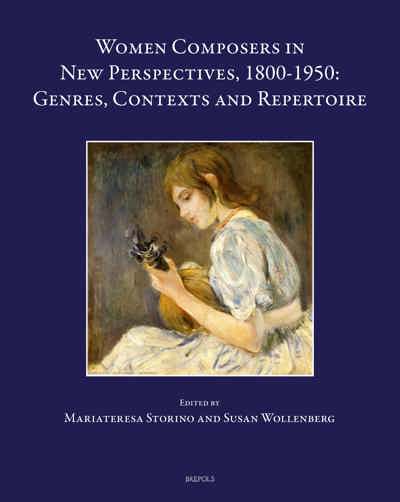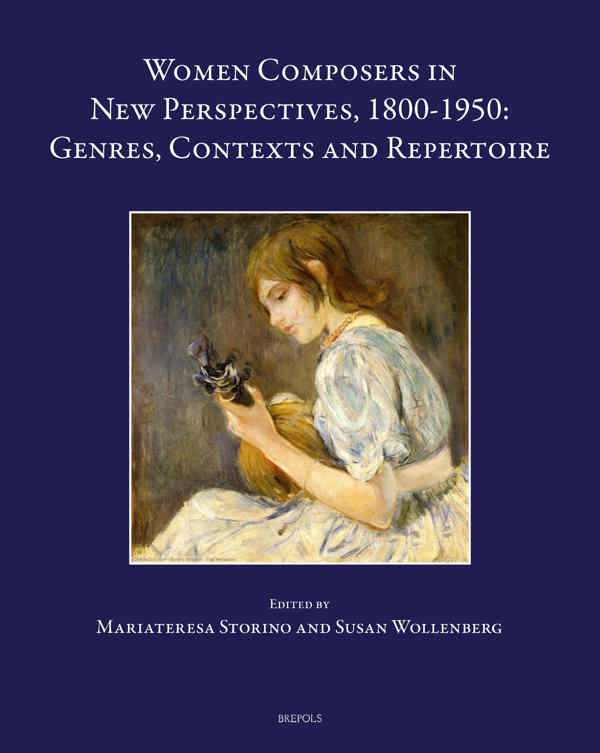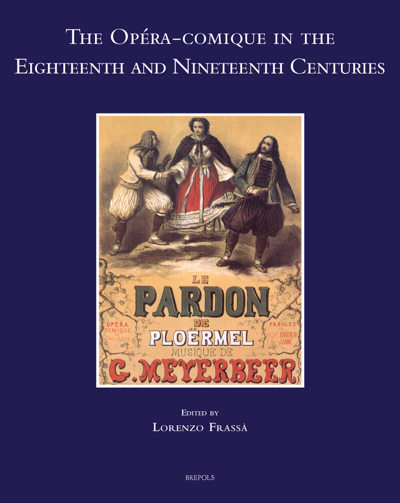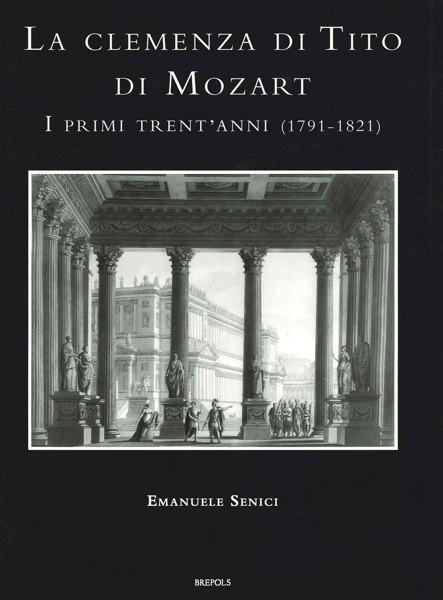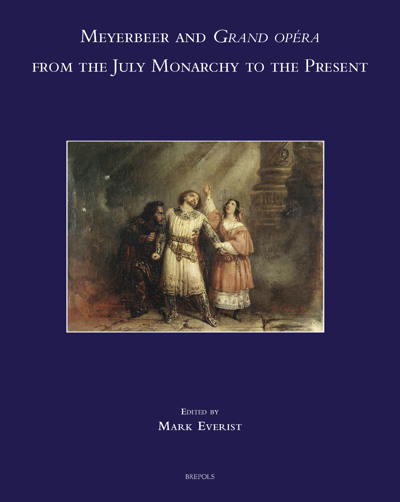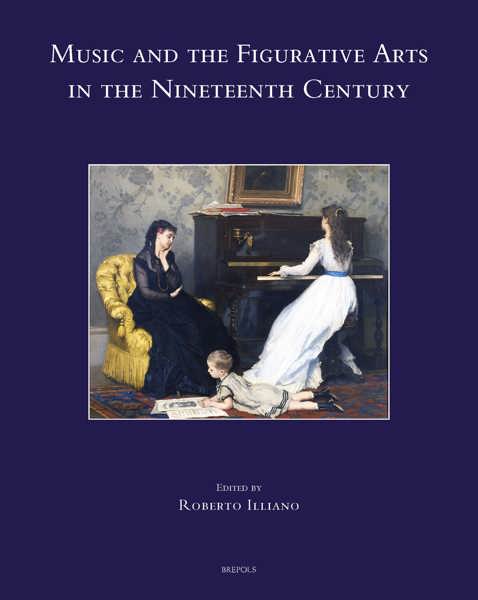
Women Composers in New Perspectives, 1800-1950
Genres, Contexts and Repertoire
Mariateresa Storino, Susan Wollenberg (eds)
- Pages: 362 p.
- Size:210 x 270 mm
- Illustrations:6 b/w, 34 musical examples
- Language(s):English, French, Italian
- Publication Year:2023
- € 120,00 EXCL. VAT RETAIL PRICE
- ISBN: 978-2-503-60630-9
- Hardback
- Available
This volume offers new scholarship on women composers of the past two centuries.
"...gender studies has had more difficulty finding a foothold outside of the Anglo-American world, such as in Italy, leading to varying efforts in bringing attention to women. The edited collection is a witness to some of the efforts as it brings together scholarship on women in music carried out at a wide range of European academic institutions. (...) Together these chapters certainly help enrich and (to some extent) diversify our understandings of women’s compositional activities in the 150 years under consideration." (Annelies Andries, in Ad Parnassum: A Journal of Eighteenth- and Nineteenth-Century Instrumental Music, 42/23, 2024, p. 142-144)
Mariateresa Storino is Professor of Music History at the Conservatoire of Music ‘G. Rossini’ (Pesaro) and collaborated until 2021 with the ‘Fondazione Istituto Liszt’ (Bologna). She has published books and essays on Franz Liszt’s life and music, and on topics including the symphonic poem and women musicians.
Susan Wollenberg was until October 2016 Professor of Music at the University of Oxford, College Lecturer at Brasenose, and Fellow of Lady Margaret Hall (where she is now Emeritus Fellow). She has published widely on topics including keyboard music, the music of Schubert, social history of music in Britain, and women composers.
This volume offers new scholarship on women composers of the past two centuries, covering a wide range of repertoire, institutions and locations, with chapters focusing on such varied topics as women writing opera in early nineteenth-century Paris; the intertextual relationship between works by Fanny Hensel and Felix Mendelssohn; women composers writing for instruments not usually associated with them in their time – specifically horn, and organ; and the subversive musical activity of female prisoners in Spain under the Franco regime. In two introductory chapters the editors present their broad perspective on women composers both in history and in modern scholarship, with particular reference to socio-historical and pedagogical aspects, and arguing the case for continued efforts to promote women’s music. The 14 chapters that follow are arranged in two parts, divided between nineteenth- and twentieth-century topics. Their authors draw on a variety of sources, including archival documents, letters, diaries, and memoirs, to illuminate the musical works produced by women during the period and the contexts in which they were written, performed, and disseminated. Collectively the chapters demonstrate the richness inherent in this area of study; in reflecting some of the directions being explored in current scholarship, they provide impetus for further research.
Mariateresa Storino – Susan Wollenberg
Preface
Susan Wollenberg (Why) Do We Need ‘Women Composers’?
Mariateresa Storino «She is not a woman composer – yet a composer, and also a woman»: La creatività femminile ‘oltre’ il genere
Part I: Nineteenth-Century Music
Chapter One: Florence Launay
She is the first, she is the only one of her sex who has vanquished on the operatic stage»: The Career of Sophie Gail at the Théâtre de l’Opéra-Comique, 1813-1818
Chapter Two: Maria Stratigou
Louise Farrenc’s Piano Études: Dates, Purpose, Reception, and Function
Chapter Three: Siegwart Reichwald
Hensel the Progressive: Narrative Strategies in Fanny Hensel’s Piano Trio, Op. 11 and Felix Mendelssohn’s String Quartet, Op. 80
Chapter Four: Anja Bunzel
Countess Elise von Schlik (Eliška Šliková): Salonnière, Patroness, Composer
Chapter Five: Christine Fischer
A Swiss Woman in Italy: Fanny Hünerwadel on Her Study Trip 1853-1854
Chapter Six: Fauve Bougard
L’ascension des femmes vers les classes de composition: le cas du Conservatoire royal de Bruxelles au xixe siècle
Chapter Seven: Steven Young
Les Organistes oubliées: Forgotten Female Organist-Composers of France
Part II: Twentieth-Century Music
Chapter Eight: Orietta Caianiello
The Emancipation of Female Musical Writing in Post-Victorian England. From Song-Cycles to Phantasies: The Society of Women Musicians
Chapter Nine: Rhiannon Mathias
Grace Williams and Welsh Music: Triads, Orchestral Music and New Beginnings
Chapter Ten: Amy E. Zigler
«Perhaps what men call a sin…»: An Examination of Ethel Smyth’s The Prison
Chapter Eleven: Elisabeth Kappel
The Compositional Œuvre of Two Viennese ‘Higher Daughters’: Else Réthi and Vilma Webenau (c. 1900-1950)
Chapter Twelve: Peter Asimov
Yvonne Loriod, Ultramodernist: Preliminary Glimpses at a Compositional Legacy
Chapter Thirteen: Daniel Lienhard
Chamber Music and Concertos for Horn/s by Women Composers – A Survey
Chapter Fourteen: Elsa Calero-Carramolino
«You lack men’s creativity»: Music and Women in Prisons under Franco (1938-1948)
Abstracts and Biographies
Index of Names
